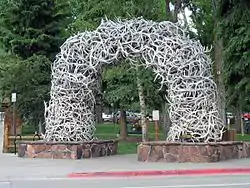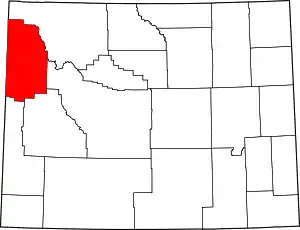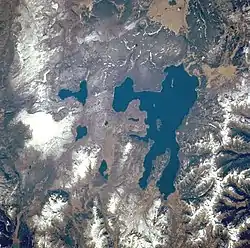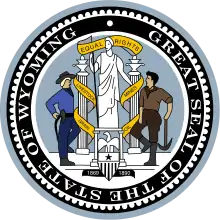Jackson, Wyoming
Jackson is a town in the Jackson Hole valley of Teton County, Wyoming, United States. The population was 9,577 at the 2010 census, up from 8,647 in 2000. It is the largest town in Teton County and its county seat.[6] Jackson is the principal town of the Jackson, WY-ID Micropolitan Statistical Area, which includes Teton County in Wyoming and Teton County in Idaho. The town, often mistakenly called Jackson Hole, derives its name from the valley in which it is located.[7] Jackson is a popular tourist destination due to its proximity to the ski resorts Jackson Hole Mountain, Snow King Mountain, and Grand Targhee, as well as Grand Teton National Park and Yellowstone National Park.
Jackson, Wyoming | |
|---|---|
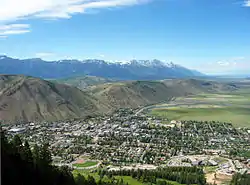 View from Snow King resort in June 2007 | |
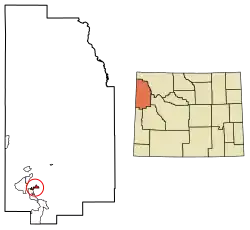 Location of Jackson in Teton County, Wyoming | |
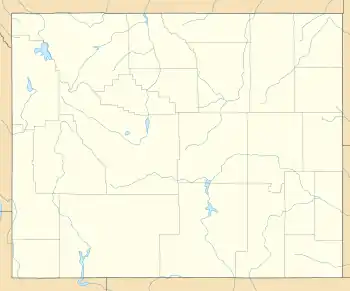 Jackson, Wyoming Location of Jackson in Teton County, Wyoming | |
| Coordinates: 43°28′31″N 110°46′9″W | |
| Country | |
| State | |
| County | |
| Government | |
| • Type | Council-Mayor |
| • Mayor | Pete Muldoon (D) |
| Area | |
| • Town | 2.99 sq mi (7.74 km2) |
| • Land | 2.96 sq mi (7.66 km2) |
| • Water | 0.03 sq mi (0.08 km2) |
| Elevation | 6,237 ft (1,901 m) |
| Population | |
| • Town | 9,577 |
| • Estimate (2019)[3] | 10,559 |
| • Density | 3,569.64/sq mi (1,378.20/km2) |
| • Metro | 31,464 |
| Time zone | UTC−7 (Mountain (MST)) |
| • Summer (DST) | UTC−6 (MDT) |
| ZIP codes | 83001, 83002, 83025 |
| Area code(s) | 307 |
| FIPS code | 56-40120[4] |
| GNIS feature ID | 1604404[5] |
| Website | jacksonwy.gov |
Economy
As of the 2010 Census,[4] the main industries which provide employment are: arts, entertainment, recreation, accommodation and food services (32.2%), construction (8.7%), retail trade (12.4%), educational services, health care and social assistance (11.9%), and professional, scientific, and management, and administrative and waste management services (11.8%).
A strong local economy, primarily due to tourism, has allowed Jackson to develop a large shopping and eating district characterized by a large number of art galleries, custom jewelers, and designer clothing retailers centered on the town square.[8]
Points of interest
- Grand Teton National Park: A national park that includes the Teton Mountain Range, roughly 310,000 acres. The park brings in more than two million recreational tourists each year.[9] The Grand Teton National Park is roughly 5 miles away from Jackson.[10]
- Yellowstone National Park: Yellowstone extends through Wyoming, Idaho, and Montana. This park was the first national park in the country, and brings in roughly four million visitors each year.[11] This park is less than 60 miles away from Jackson.[12]
- National Elk Refuge: The refuge was created to shelter one of the largest elk herds in the country and borders the town of Jackson. Throughout the winter visitors can go on horse-drawn sleigh rides to view the herd.
- Jackson Hole Mountain Resort: The resort opened in 1966, 12 miles north of Jackson. It has abundant steep terrain and has one of the highest vertical drops in North America, at 4,139 feet (1,262 m).
- Snow King Mountain Resort: The first ski resort in Jackson and is significantly cheaper than Jackson Hole Mountain Resort. Even though Snow King is cheaper it is still quite a challenging hill. This resort is located on the Southeast edge of town.
- Grand Targhee Resort: About an hour away, 42 miles, on the west side of the Teton Range in Alta, opened in 1969, it is accessed through Idaho over Teton Pass.
- National Museum of Wildlife Art: Overlooking the National Elk Refuge is the National Museum of Wildlife Art which shows and preserves many wildlife artworks. Along with pieces inside of the museum, there is a ¾ mile trail with many sculptures along it.
- Grand Teton Music Festival: This is a seven-week classical music festival held every summer in the town of Jackson.[13]
- Center for the Arts: The center was founded in 1991 to help support an artist culture within the town. Construction of the facility was completed in 2007.[14]
- Elkfest: The annual Jackson Hole Elk Antler Auction occurs each spring. At this event, members of the Boy Scouts of America help sell all the antlers collected on the nearby National Elk Refuge. Profits go to help the local Boy Scouts and the refuge.[15]
History
Jackson Hole was originally populated by Native American tribes including the Shoshoni, Crow, Blackfeet, Bannock, and Gros Ventre. In the early 1800s, the locality became a prime area for trappers and mountain men to travel through, one example being John Colter. After being discharged from the Corps of Discovery of the Lewis and Clark Expedition in 1806 at Fort Mandan, in present-day North Dakota, Colter visited Jackson Hole during the winter of 1807/1808. Among other mountain men who visited the valley include Jim Bridger, Jedediah Smith, and William Sublette, who are responsible for many of the names in the area. David Edward Jackson gave his name to the valley after a winter spent on the shores of Jackson Lake.
As part of the Hayden Expedition of 1871 and 1872, William Henry Jackson took the first photographs of the Teton Mountains and Yellowstone. His photographs, along with the sketches by Tom Moran, were important evidence to convince Congress to protect Yellowstone National Park. Yellowstone National Park became the first National Park in 1872. Grand Teton National Park was created in 1929 and greatly expanded in 1950 through the generous efforts of John D. Rockefeller, Jr., who purchased and then donated over 30,000 acres.
The Town of Jackson was named in 1894. Some of the early buildings remain and can be found throughout the area of the Town Square. The Town of Jackson elected the first all-woman city government (including town council and mayor, who in turn appointed women to town marshal, town clerk and treasurer) in 1920.[16]
The first ski rope tow was built at Teton Pass in 1937 and Snow King Resort was established in 1930. Teton County now has three excellent ski areas including Jackson Hole Mountain Resort in Teton Village, Grand Targhee Ski and Summer Resort located on the West slope of the Tetons, and Snow King Resort.
The Town of Jackson is the county seat of Teton County and the only incorporated municipality in the region. Less than 3% of land in Teton County is privately owned. 97% of the 2,697,000 acres in Teton County are federally or state owned/managed.
In 2009, the Town of Jackson was designated as a Preserve America Community. This designation recognizes that, as a community, the town protects and celebrates its heritage, uses historic assets for economic development and encourages people to experience and appreciate local historic resources.
In September 2016, the town went viral from an ongoing live stream on YouTube consisting of various views of the town, especially a webcam angled on the town square. Notable interests were the abundance of red trucks in the streets and a sheriff performing the dab in front of the live webcam. As of December 2020, the webcam is still operational.[17]
Geography
Jackson is located at 43°28′31″N 110°46′9″W (43.475, −110.769),[18] at an elevation of 6,237 feet (1,901 m) above sea level. According to the United States Census Bureau, the town has a total area of 2.95 square miles (7.64 km2), of which 2.91 square miles (7.54 km2) is land and 0.04 square miles (0.10 km2) is water.[19]
Jackson is surrounded by the Teton and Gros Ventre mountain ranges. The Teton Range is commonly associated with Jackson Hole and is a popular sightseeing attraction for many visitors. The Gros Ventre Range, by contrast, is geologically older than the Tetons and has a much broader width, which encompasses huge expanses of wilderness and is not as easily accessible.
Soils at Jackson Hole are mostly dark, excessively drained, moderately alkaline gravelly loam of the Greyback series.[20]
Flat Creek, a tributary of the Snake River, runs through the town.
Climate
Jackson experiences a humid continental climate (Köppen Dfb). Due to its location in a very narrow river valley, Jackson and the rest of the Snake headwaters[21] experience a unique microclimate that gets considerably more precipitation – much of it snow – than the majority of Wyoming and has higher humidity during much of the year.[22] Its elevation is also responsible for extreme differences between day and night temperatures, which makes the climate very close to being classified as subarctic (Köppen Dfc). Extreme temperatures range from −50 °F (−46 °C) on January 1, 1979, to 98 °F (37 °C) on August 19, 1981, and on average 249.7 mornings fall below freezing and 41.2 of these below 0 °F (−18 °C); the average window for subzero Fahrenheit temperatures is from November 19 to March 12 and freezing can occur in any month.
Snowfall averages 71.4 inches or 1.81 metres with a median of 62.7 inches or 1.59 metres. The highest monthly total has been 56.0 inches (1.42 m) in January 1969, and the most in one season being 153.3 inches (3.89 m) between July 1966 and June 1967.[23]
| Climate data for Jackson, Wyoming | |||||||||||||
|---|---|---|---|---|---|---|---|---|---|---|---|---|---|
| Month | Jan | Feb | Mar | Apr | May | Jun | Jul | Aug | Sep | Oct | Nov | Dec | Year |
| Record high °F (°C) | 55 (13) |
58 (14) |
70 (21) |
79 (26) |
90 (32) |
95 (35) |
97 (36) |
98 (37) |
93 (34) |
87 (31) |
66 (19) |
55 (13) |
98 (37) |
| Average high °F (°C) | 28.2 (−2.1) |
33.6 (0.9) |
42.7 (5.9) |
52.9 (11.6) |
63.0 (17.2) |
73.7 (23.2) |
81.9 (27.7) |
81.0 (27.2) |
71.3 (21.8) |
58.6 (14.8) |
40.0 (4.4) |
28.2 (−2.1) |
54.6 (12.6) |
| Average low °F (°C) | 5.0 (−15.0) |
8.1 (−13.3) |
17.5 (−8.1) |
24.4 (−4.2) |
30.8 (−0.7) |
37.0 (2.8) |
40.9 (4.9) |
39.2 (4.0) |
31.4 (−0.3) |
23.4 (−4.8) |
15.8 (−9.0) |
5.9 (−14.5) |
23.3 (−4.8) |
| Record low °F (°C) | −50 (−46) |
−44 (−42) |
−32 (−36) |
−5 (−21) |
5 (−15) |
19 (−7) |
24 (−4) |
18 (−8) |
8 (−13) |
2 (−17) |
−27 (−33) |
−49 (−45) |
−50 (−46) |
| Average precipitation inches (mm) | 1.39 (35) |
1.07 (27) |
1.16 (29) |
1.18 (30) |
2.21 (56) |
1.61 (41) |
1.28 (33) |
1.32 (34) |
1.32 (34) |
1.22 (31) |
1.56 (40) |
1.46 (37) |
16.78 (427) |
| Average snowfall inches (cm) | 15.9 (40) |
11.8 (30) |
7.7 (20) |
2.8 (7.1) |
0.9 (2.3) |
0.2 (0.51) |
0 (0) |
0 (0) |
0.1 (0.25) |
1.1 (2.8) |
12.3 (31) |
18.6 (47) |
71.4 (180.96) |
| Average precipitation days (≥ 0.01 in) | 11.3 | 8.0 | 8.8 | 7.6 | 10.9 | 8.9 | 7.5 | 8.7 | 8.0 | 7.8 | 10.2 | 10.8 | 108.5 |
| Average snowy days (≥ 0.1 in) | 9.6 | 5.9 | 5.0 | 1.8 | 0.3 | 0.2 | 0 | 0 | 0 | 0.7 | 5.9 | 9.5 | 38.9 |
| Source 1: NOAA (normals, 1971−2000)[24] | |||||||||||||
| Source 2: The Weather Channel (Records)[25] | |||||||||||||
Demographics
| Historical population | |||
|---|---|---|---|
| Census | Pop. | %± | |
| 1900 | 59 | — | |
| 1910 | 264 | 347.5% | |
| 1920 | 307 | 16.3% | |
| 1930 | 533 | 73.6% | |
| 1940 | 1,046 | 96.2% | |
| 1950 | 1,244 | 18.9% | |
| 1960 | 1,437 | 15.5% | |
| 1970 | 2,688 | 87.1% | |
| 1980 | 4,511 | 67.8% | |
| 1990 | 4,472 | −0.9% | |
| 2000 | 8,647 | 93.4% | |
| 2010 | 9,577 | 10.8% | |
| 2019 (est.) | 10,559 | [3] | 10.3% |
| source:[26][27] | |||
As of 2000 the median income for a household in the town was $59,605, and the median income for a family was $69,432. Male full-time, year-round workers had a median income of $35,892 versus $29,175 for females. The per capita income for the town was $27,066. About 4.2% of families and 6.4% of the population were below the poverty line, including 6.7% of those under age 18.
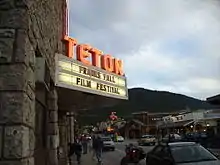
2010 census
As of the census[2] of 2010, there were 9,577 people, 3,964 households, and 1,858 families residing in the town. The population density was 3,291.1 inhabitants per square mile (1,270.7/km2). There were 4,736 housing units at an average density of 1,627.5 per square mile (628.4/km2). The racial makeup of the town was 79.8% White, 0.4% African American, 0.8% Native American, 1.4% Asian, 0.1% Pacific Islander, 15.2% from other races, and 2.3% from two or more races. Hispanic or Latino of any race were 27.2% of the population.
There were 3,964 households, of which 24.7% had children under the age of 18 living with them, 35.2% were married couples living together, 6.6% had a female householder with no husband present, 5.0% had a male householder with no wife present, and 53.1% were non-families. 31.9% of all households were made up of individuals, and 5.3% had someone living alone who was 65 years of age or older. The average household size was 2.39 and the average family size was 3.04.
The median age in the town was 31.9 years. 18% of residents were under the age of 18; 11.6% were between the ages of 18 and 24; 43.8% were from 25 to 44; 20.5% were from 45 to 64; and 6.2% were 65 years of age or older. The gender makeup of the town was 54.1% male and 45.9% female.
Government
Jackson is administered by a mayor and town council. The current mayor is Pete Muldoon.[28]
The following are currently members of the Town Council: Hailey Morton Levinson (vice mayor), Arne Jorgensen, Jonathan Schecter, and Jim Stanford.[28]
Education
Public education in the town of Jackson is provided by Teton County School District #1. Schools serving the town include Jackson Elementary School (grades K–5), Colter Elementary School (grades K–5), Munger Mountain Elementary, Jackson Hole Middle School (grades 6–8), Jackson Hole High School, Summit High School, the Jackson Hole Classical Academy (grades K–10), Jackson Hole Community School and the Journeys School.
Jackson has a public library, a branch of the Teton County Library.[29] The 1938 Teton County Library, which is a rustic log cabin, is on the National Register of Historic Places. The building now houses the Huff Memorial Library.[30]
Transportation
The town is served by Jackson Hole Airport, the busiest airport in the state of Wyoming. A public bus system ("The START Bus", or Southern Teton Area Rapid Transit) services the town of Jackson, the route to Teton Village, and adjacent communities in Star Valley, Wyoming and Teton Valley, Idaho. There are also airport buses to Salt Lake City, and places in between.
In popular culture
Movies shot in Jackson include The Big Trail (1930), The Big Sky (1952), Shane (1953), Any Which Way You Can (1980), Rocky IV (1985), Ghosts Can't Do It (1990), and Django Unchained (2012).[31] It is also a major location in the action-adventure video game The Last of Us (2013) and its sequel (2020), in which it is home to a large community of survivors in a post-apocalyptic world.
Jackson gained significant fame when a livestream of the town square went viral on YouTube in 2016, leading to much fascination with the town's elk antler arch, its law enforcement, and its prevalence of red trucks.[32][33]
Notable people
See also
References
- "2019 U.S. Gazetteer Files". United States Census Bureau. Retrieved August 7, 2020.
- "U.S. Census website". United States Census Bureau. Retrieved 2012-12-14.
- "Population and Housing Unit Estimates". United States Census Bureau. May 24, 2020. Retrieved May 27, 2020.
- "U.S. Census website". United States Census Bureau. Retrieved 2008-01-31.
- "US Board on Geographic Names". United States Geological Survey. 2007-10-25. Retrieved 2008-01-31.
- "Find a County". National Association of Counties. Archived from the original on May 31, 2011. Retrieved 2011-06-07.
- The Utah Genealogical and Historical Magazine, Volumes 9-10. 1918. p. 190.
- "Jackson Hole Shopping". Jackson Hole Traveler. 2014-11-14. Retrieved 2019-09-29.
- "Grand Teton National Park Experiences Record Visitation in 2014 - Grand Teton National Park (U.S. National Park Service)". www.nps.gov. Retrieved 2016-04-24.
- "Google Maps". Google Maps. Retrieved 2016-04-24.
- "Visitation Statistics - Yellowstone National Park (U.S. National Park Service)". www.nps.gov. Retrieved 2016-04-24.
- "Google Maps". Google Maps. Retrieved 2016-04-24.
- "About". Grand Teton Music Festival. Retrieved 2016-04-24.
- "About The Center". Center for the Arts. Retrieved 2016-04-24.
- https://elkfest.org/
- "Petticoat Rules: The first women leaders of Jackson 100 years ago". Buckrail - Jackson Hole, news. 2020-05-26. Retrieved 2020-10-28.
- https://www.youtube.com/watch?v=1EiC9bvVGnk
- "US Gazetteer files: 2010, 2000, and 1990". United States Census Bureau. 2011-02-12. Retrieved 2011-04-23.
- "US Gazetteer files 2010". United States Census Bureau. Archived from the original on January 12, 2012. Retrieved 2012-12-14.
- http://casoilresource.lawr.ucdavis.edu/gmap/
- National Oceanic and Atmospheric Administration; Monthly Precipitation 1895 to 2015; Wyoming Climate Division 2 (Snake Drainage)
- National Oceanic and Atmospheric Administration; Monthly Precipitation 1895 to 2015; Wyoming State Area Averaged
- National Weather Service; NOW Data Riverton, Wyoming
- "Climatography of the United States No. 20 1971−2000: JACKSON, WY" (PDF). National Oceanic and Atmospheric Administration. Retrieved 2011-04-12.
- "Monthly Averages for Jackson, WY". The Weather Channel. Retrieved January 13, 2011.
- "Historical Decennial Census Population for Wyoming Counties, Cities, and Towns". Wyoming Department of State / U.S. Census Bureau. Retrieved 2012-04-01.
- Moffatt, Riley. Population History of Western U.S. Cities & Towns, 1850-1990. Lanham: Scarecrow, 1996, 341.
- "Mayor & Town Council | Jackson, WY". www.jacksonwy.gov. Retrieved 2018-06-03.
- "Wyoming Public Libraries". PublicLibraries.com. Retrieved 14 June 2019.
- "The Huff Memorial - Old Teton County Library - Wyoming Historical Markers on Waymarking.com". www.waymarking.com. Retrieved 2019-09-29.
- Bath, Jack (1991). Roadside Hollywood: The Movie Lover's State-By-State Guide to Film Locations, Celebrity Hangouts, Celluloid Tourist Attractions, and More. Contemporary Books. Pages 75–76. ISBN 9780809243266.
- "Red truck, red truck! Town's mundane webcam grips YouTube". September 2016.
- "Watch a Very Hip Sheriff Casually Hit the Dab on the Viral Jackson Hole Livestream". September 2016.
- Dunfee, Ryan (September 18, 2013). "Want To Own Walmart Heiress Christy Walton's Jackson Mansion?". Curbed. Retrieved August 24, 2017.
- "John Mars". Forbes. Retrieved August 24, 2017.
- "At home with Dick Cheney". USA Today. October 20, 2013. Retrieved August 24, 2017.
- "Inside 'Country Girl' Sandra Bullock's Secret Wyoming Hideaway". RadarOnline. 2017-04-21. Retrieved 2019-09-29.
External links
| Wikivoyage has a travel guide for Jackson (Wyoming). |
